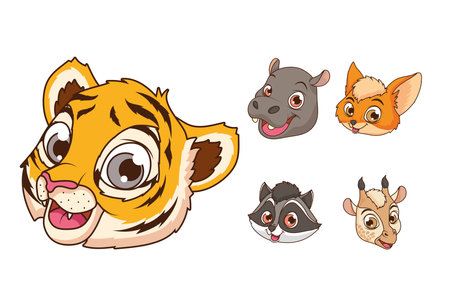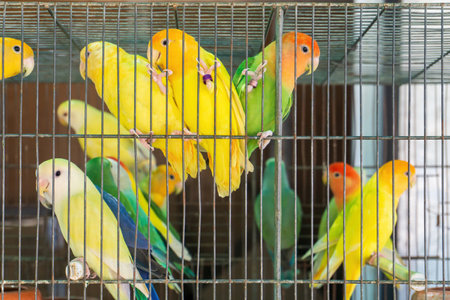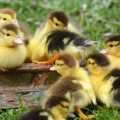Introduction to Parakeets in the UK
Parakeets, commonly referred to as budgies or budgerigars in the UK, have become an increasingly popular choice for pet owners across the country. Their vibrant plumage, sociable nature, and relatively easy care requirements make them a favourite among both families and individuals. Originally native to Australia, parakeets have adapted remarkably well to British homes and even some local outdoor environments. Over the years, their cheerful presence and ability to mimic sounds have earned them a special place in many British households. As urban green spaces and parks provide suitable conditions, wild flocks of ring-necked parakeets can now be spotted in cities like London, adding a splash of colour to the local wildlife scene. The table below highlights key reasons for their popularity in the UK:
| Reason | Description |
|---|---|
| Adaptability | Thrive in British homes and adapt well to indoor living |
| Companionship | Social birds that bond well with people |
| Low Maintenance | Require less intensive care compared to many other pets |
| Entertainment | Mimic sounds and display playful behaviours |
This unique blend of charm, adaptability, and companionship has solidified the parakeet’s reputation as one of the UK’s most beloved pet birds.
2. Why Parakeets Make Great Pets
Parakeets, often called budgies in the UK, are cherished for their vibrant personalities and social nature. Their friendly disposition makes them ideal companions for individuals, couples, and families alike. Unlike some more demanding pets, parakeets are relatively easy to care for and can adapt well to various living situations—whether you live in a flat in London or a cottage in the countryside.
The Friendly Nature of Parakeets
Parakeets are naturally sociable birds that thrive on interaction. They quickly form bonds with their owners and can be taught to perch on your hand or shoulder. Many UK parakeet owners find joy in their birds’ cheerful chirping and playful antics, which can help brighten up any home environment.
Intelligence and Trainability
One of the standout features of parakeets is their intelligence. They can learn to mimic sounds and words, solve simple puzzles, and even perform tricks with consistent training. This mental agility not only provides entertainment but also creates rewarding opportunities for owners to engage with their pets.
Companionship and Wellbeing
For those seeking companionship, parakeets offer affection and loyalty. Their presence can provide emotional support, reduce feelings of loneliness, and even improve overall wellbeing. Because they’re small and relatively quiet compared to other parrots, parakeets suit both busy professionals looking for a low-maintenance pet and retirees who enjoy spending time interacting with their feathered friends.
Suitability for Different Households
The adaptability of parakeets means they’re suitable for various households. Here’s a quick comparison:
| Household Type | Suitability | Considerations |
|---|---|---|
| Families with Children | Excellent | Supervision recommended; teach gentle handling. |
| Singles/Couples | Very Good | Great for companionship; interactive play is beneficial. |
| Elderly Owners | Ideal | Low maintenance; uplifting presence. |
| Flats/Small Spaces | Suitable | Cage size matters; daily out-of-cage time needed. |
| Larger Homes/Gardens | Highly Suitable | More space for flight; potential for aviaries. |
No matter your living situation or experience level with pets, parakeets stand out as delightful additions to UK homes—bringing colour, conversation, and companionship into everyday life.

3. Proper Care and Nutrition for Parakeets
Feeding Your Parakeet: A Balanced Diet
Ensuring your parakeet receives the correct nutrition is vital for its health and happiness, especially within the UK’s unique climate. Parakeets thrive on a varied diet comprising seeds, fresh fruits, vegetables, and occasional supplements. While seed mixes are popular, a diet solely based on seeds can lead to nutritional deficiencies. Incorporating leafy greens such as spinach, kale, and broccoli, along with fruits like apple (without seeds) and pear, helps provide essential vitamins and minerals.
| Food Type | Recommended Frequency | Notes |
|---|---|---|
| Seed Mixes | Daily | Main staple, but must be high quality and fresh |
| Fresh Vegetables | Daily | Spinach, broccoli, carrots (avoid avocado) |
| Fresh Fruits | Several times per week | Apples (no pips), pears, berries (avoid citrus in excess) |
| Cuttlefish Bone/Mineral Block | Always available | For calcium and beak health |
Healthcare Considerations in the UK Climate
The UK’s often damp and cool weather means parakeets need extra care to prevent respiratory issues. Always house your bird away from draughts and ensure their cage is kept in a well-ventilated but not chilly area. During colder months, consider using a cage cover at night or providing additional warmth with a safe heat lamp specifically designed for birds. Regularly clean food and water containers to avoid mould growth and bacterial infections that can thrive in humid conditions.
Routine Health Checks
- Observe daily for changes in behaviour or appearance (fluffed feathers, lethargy).
- Trim nails as needed – ask an avian vet for guidance.
- Monitor droppings; sudden changes may indicate illness.
Daily Routines for Happy Parakeets
A consistent routine helps parakeets feel secure. Aim for regular feeding times in the morning and evening. Fresh water should always be available and changed daily. Allow time out of the cage in a safe room each day to encourage exercise and social interaction – this is especially important as parakeets are highly intelligent and active birds.
Quick Checklist for Daily Care:
- Provide fresh food and water every day.
- Clean food dishes and water bottles daily.
- Check cage cleanliness; spot-clean as required.
- Offer toys or branches for mental stimulation.
Taking these steps ensures your parakeet remains healthy, comfortable, and lively throughout the year, making them delightful companions suited to homes across the UK.
4. Ideal Housing and Enrichment
Providing the right housing and enrichment is essential for keeping parakeets happy and healthy in a British home. The typical UK household may vary in size and layout, so it’s important to choose suitable accommodation for your feathery companions.
Cage Size and Design
Parakeets are active birds that require ample space to stretch their wings and play. As a general rule, the larger the cage, the better. For one or two parakeets, a cage measuring at least 60cm x 40cm x 50cm is recommended, but more space is always appreciated. Ensure that the bars are spaced no more than 1.5cm apart to prevent accidental escapes or injuries. Opt for cages made from non-toxic materials and easy to clean surfaces.
| Cage Feature | Recommendation |
|---|---|
| Minimum Size | 60cm (L) x 40cm (W) x 50cm (H) |
| Bar Spacing | No more than 1.5cm apart |
| Material | Non-toxic metal or powder-coated finish |
| Shape | Rectangular over round, for better movement |
Cage Location in the British Home
Place your parakeet’s cage in a bright room away from direct draughts, radiators, or open windows—typical in many UK homes. Avoid kitchens due to cooking fumes and potential hazards. Living rooms or quiet dining areas are often ideal, ensuring the birds feel included as part of the family without being overwhelmed by constant noise or activity.
Enrichment Activities
Boredom can lead to behavioural issues in parakeets. Provide a variety of perches of different textures and diameters, swings, ladders, and safe chewable toys to stimulate their natural curiosity. Rotate toys regularly to maintain interest. Foraging opportunities, such as hiding millet sprays or using puzzle feeders, encourage natural feeding behaviours.
Popular Enrichment Ideas:
- Natural wood perches (avoid painted or chemically treated wood)
- Puzzle feeders with favourite seeds
- Shreddable paper toys
- Swinging ropes and climbing ladders
- Mirror toys (in moderation if only one bird is kept)
Safety Considerations for UK Households
The British climate means central heating is common; avoid placing cages near radiators as sudden temperature changes can stress birds. Be mindful of household pets like cats or dogs who may be curious about new feathered friends. Use pet-safe cleaning products when maintaining cages and accessories. Always supervise any out-of-cage time, ensuring windows and doors are securely closed to prevent accidental escape.
Summary Table: Key Housing Tips for UK Parakeet Owners
| Aspect | Advice |
|---|---|
| Cage Placement | Avoid draughts, direct sunlight, kitchens, and radiators; choose family living areas. |
| Toys & Perches | Diverse textures and types; rotate regularly. |
| Cleaning & Hygiene | Use bird-safe cleaners; clean weekly. |
| Free-flight Safety | Close windows/doors; supervise; keep away from other pets. |
By providing ideal housing and thoughtful enrichment tailored to the British home environment, you’ll ensure your parakeets remain lively, stimulated, and content companions.
5. Common Health Issues and When to Seek a Vet
Keeping your parakeet healthy in the UK involves being vigilant for signs of illness and understanding when professional help is necessary. While these birds are generally hardy, they can still suffer from a range of health concerns. Here’s a brief guide to recognising common symptoms and advice on seeking help from local avian vets.
Recognising Signs of Illness in Parakeets
| Sign/Symptom | Possible Cause | Action Needed |
|---|---|---|
| Lethargy or Fluffed-Up Feathers | Cold, infection, stress | Monitor closely; seek vet if persists over 24 hours |
| Change in Droppings | Diet change, infection, digestive issue | If colour or consistency changes last more than a day, consult a vet |
| Loss of Appetite | Illness, dental issues | If bird refuses food for over 12 hours, contact a vet promptly |
| Sneezing or Nasal Discharge | Respiratory infection, allergies | If persistent or with other symptoms, visit an avian vet |
| Overgrown Beak or Nails | Nutritional deficiency, lack of perches/toys | Have an avian vet trim and assess overall health |
UK-Specific Health Concerns
The UK’s variable climate means indoor parakeets may be exposed to draughts or sudden temperature drops. Additionally, certain household items such as scented candles, non-stick cookware fumes (Teflon), and houseplants can pose risks. Be mindful of seasonal outbreaks of avian diseases such as psittacosis, which is notifiable in the UK.
Finding a Local Avian Vet
Not all veterinary clinics have experience with birds. It’s advisable to register your parakeet with a local practice that has a specialist avian vet. The British Veterinary Association (BVA) and the Royal College of Veterinary Surgeons (RCVS) websites provide directories where you can search for avian-certified professionals in your area.
When to Seek Immediate Help
- Your parakeet is having difficulty breathing or is unresponsive.
- You notice bleeding that does not stop quickly.
- The bird suffers injury from another pet or accident.
If you’re ever unsure about your parakeet’s health, it’s always better to err on the side of caution and consult a professional. Early intervention can make all the difference in ensuring your feathered friend remains happy and healthy in your UK home.
6. Legal and Ethical Considerations
When keeping parakeets as pets in the UK, it’s essential to be aware of the legal and ethical responsibilities involved. The UK has specific regulations to ensure the welfare of captive birds, including import laws, welfare standards, and guidelines for responsible ownership. Understanding these rules not only helps you stay compliant but also ensures your parakeet enjoys a safe and healthy environment.
UK Regulations on Parakeet Ownership
The table below summarises key legal considerations for parakeet owners in the UK:
| Aspect | Details |
|---|---|
| Import Laws | Parakeets must be imported through approved channels with proper documentation. Wild-caught birds are subject to strict controls under CITES (the Convention on International Trade in Endangered Species). |
| Welfare Standards | The Animal Welfare Act 2006 requires owners to provide adequate food, water, shelter, and veterinary care. Enclosures must meet minimum size requirements and allow for natural behaviours. |
| Responsible Ownership | Owners must prevent escape into the wild, as non-native species can impact local ecosystems. Ethical breeding practices and regular health checks are encouraged. |
Ethical Responsibilities of Parakeet Owners
Beyond legal compliance, ethical ownership means providing a stimulating environment with companionship, mental enrichment, and appropriate social interaction. It’s vital not to support illegal wildlife trade or unethical breeding. Consider adopting from reputable breeders or rescue centres that prioritise bird welfare.
Staying Informed and Up to Date
Laws and best practices can change over time. Always consult official resources such as GOV.UK Pet Travel Guidance, local authorities, or avian veterinarians for the latest information regarding parakeet care and ownership in the UK.


